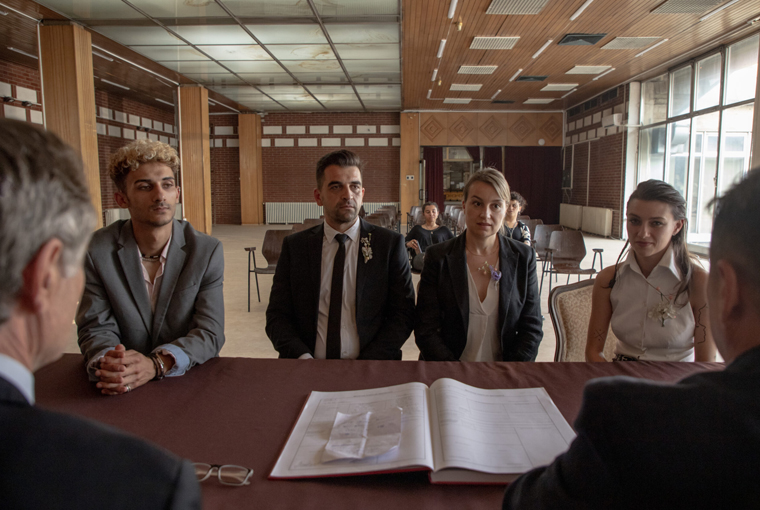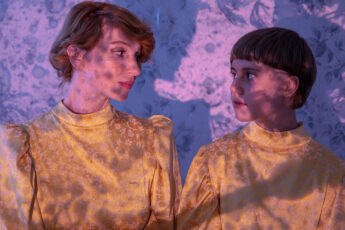"Needing Someone Doesn’t Go Away."
Goran Stolevski’s Housekeeping for Beginners (Domakinstvo za pocetnici, 2023)
Vol. 140 (December 2023) by Jack Page
Welfare officer Dita lives with her girlfriend Suada. They share a home with Suada’s two daughters Mia and Vanesa, a man named Toni and three other gay, young women. In her spare time, Dita has her head buried in her laptop researching affordable treatment and alternative medicine for Suada’s pancreatic cancer diagnosis. The sudden arrival of Toni’s gay lover Ali complicates matters further when Dita and Suada try to negotiate their unforeseeable future. Before Suada dies of the disease, she begs Dita to be the maternal role model for Mia and Vanesa. In a desperate attempt to ensure Dita honors her promise, Suada resorts to self-harm, cutting her wrists until Dita verbally agrees to “be the mom”. In her mother’s absence, Vanesa becomes increasingly reckless, binge drinking, running away from home and lying to the police that she’d been kidnapped. As Dita and Vanesa’s relationship becomes fraught with tension, their troubles run the risk of destroying the very fabric of the family Suada lovingly adopted.
Although the film is weighed down by its grave themes and some shocking scenes of violence, it is also littered with darkly comic relief. In order for Dita (Anamaria Marinca) to gain full custody of Mia (Džada Selim) and Vanesa (Mia Mustafi), she must forge a birth certificate that states Toni (Vladimir Tintor) is the father and proceed to marry him. At the marriage ceremony, all the family are sniggering in the background as Dita and Toni exchange their short and imaginary wedding vows. When the officiant asks if they are related, because both husband and wife are trying to finish the ceremony as speedily as possible, they accidentally say yes. During the celebration back home, Ali (Samson Selim) makes a drunken toast to thank Toni for letting him be a witness to his own boyfriend’s wedding.
These moments of dramatic irony are even more humorous when Dita and Toni must infiltrate a heteronormative social gathering. Undercover, they try not to arouse suspicion from the straight people at the dinner party, but Toni is nearly exposed for not being interested enough in the football game playing in the background and Dita reprimands him since he “had to put on a faggy t-shirt”. Mia, the potty-mouthed toddler, is also a joyful source of dark humor when she is at her most rambunctious, drawing with crayons on the wall or gleefully repeating the swearwords she so often hears around the home.
The tightly framed shots of interior sequences in the home give the impression that the apartment is overcrowded with these larger-than-life characters. The family members are constantly dodging each other in the stairway, arguing over the bathroom privileges and they barely fit at the dining table together. Drinks are spilled, plates are smashed, food is thrown. The décor is a mess and filled with bric-a-brac, which amplifies the sense that the home is being overwhelmed by their personalities, which appear to be spilling out onto the floors and walls. However cramped, their energetic bickering and enthusiastic pranks are the lifeblood of the home, and their wailing is an oddly positive sound to hear. It shows how Suada (Alina Șerban) has built a safehouse for these outcasts, who trust and rely on her and Dita’s generosity for such a space where they feel comfortable being their unadulterated selves. The buzz of their self-proclaimed community, the “Republic of Gypsies”, is an apt example of the film’s observant and authentic nature, reinforcing the closeness of their relationships in the crass and offensive dialogs they share. When newcomer Ali arrives at the home, Suada tests his knowledge of all the potential suitors living in Shutka, suggesting a “horse exorcist” and “vampire hunter”. As well as these kinds of flippant but racially charged remarks, the sisters in particular use homophobic slang in a very nonchalant way that suggests their particular tribe of strong, independent lesbians have reclaimed the terms back.
Anamaria Marinca’s performance as the reluctant mother figure is intensely refrained. Emotionally grounded by her acute sense of responsibility as the main breadwinner of the household, Dita is not given the privilege of dramatic outbursts unlike the other characters. Instead, in moments of utter chaos, her extreme sense of restraint is painfully conveyed through Marinca’s disarming facial expression and fatigued body language. Ever the pacifist, Dita seems to understand that within the home she must act as the moral anchor for the rest of the family. In emergency circumstances, Dita perseveres for the most rational of outcomes. In the last scene of the film, Dita’s speech to Vanesa offers a fleeting glimpse into her own personal vulnerability and sorrow that she is so determined to bury internally. As they share a cigarette, Dita explains, “Needing someone doesn’t go away, even when you’re old”. This is Dita’s closest admission regarding the pain she feels now being alone. If we consider the logical Dita to be the brain of the family, then her high-spirited lover Suada was its heart, and it is a hole that she knows she cannot fill. After Dita’s confession, she and Vanesa finally strike a deal, that Dita stops trying to be Vanesa’s mother and they agree to treat each other as sisters.
Through a queer perspective, Housekeeping for Beginners illustrates the fundamental unimportance of race, relation, gender, or sexual orientation when it comes to family and that – universally – it is simply about taking care of the people you love.




Leave a Comment